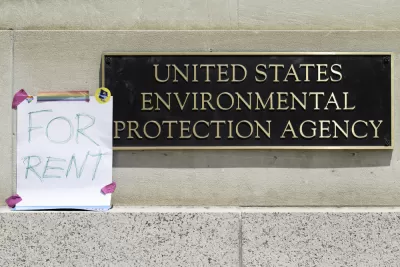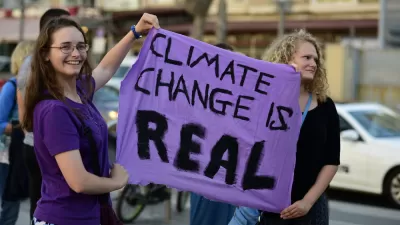An even set in motion years ago by the Trump administration came to fruition on November 4 while most Americans were paying attention to the election.

Brady Dennis, Juliet Eilperin, and Dino Grandoni report that the United States officially "became the first and only nation to withdraw from the Paris climate accord on Wednesday, even as the outcome of the presidential race remained unknown."
With the result of the presidential election still undetermined, the direction of the United States as a global partner in the effort to reduce carbon emissions before the worst projections for climate change and sea-level rise are impossible to avoid hangs in the balance. A Trump victory would mean years of stagnation on climate action in the United States.
Here's what the climate status quo looks like in the United States, according to the article:
The United States could miss its own Paris accord commitment to lower carbon emissions 26 percent to 28 percent below 2005 levels by 2025. According to an analysis by the Rhodium Group, the country is on track to cut its emissions between 20 and 27 percent, depending on how quickly the economy recovers from the pandemic. But it would need to cut emissions by 43 percent over the next decade to be on track to reach net zero emissions by 2050 — a goal that the European Union, Japan, South Korea and other nations have set in a push to slow the world’s warming.
The two candidates for the presidency would "undoubtedly lead the country in opposite directions on climate policy.
"But even as the electoral map appeared to tilt in Biden’s favor Wednesday, signs pointed toward the GOP retaining control of the Senate," according to the article. "That outcome would dim the prospects that a Biden administration could shepherd a comprehensive climate bill through Congress."
FULL STORY: As U.S. leaves Paris accord, climate policy hangs on election outcome

Maui's Vacation Rental Debate Turns Ugly
Verbal attacks, misinformation campaigns and fistfights plague a high-stakes debate to convert thousands of vacation rentals into long-term housing.

Planetizen Federal Action Tracker
A weekly monitor of how Trump’s orders and actions are impacting planners and planning in America.

In Urban Planning, AI Prompting Could be the New Design Thinking
Creativity has long been key to great urban design. What if we see AI as our new creative partner?

How Trump's HUD Budget Proposal Would Harm Homelessness Response
Experts say the change to the HUD budget would make it more difficult to identify people who are homeless and connect them with services, and to prevent homelessness.

The Vast Potential of the Right-of-Way
One writer argues that the space between two building faces is the most important element of the built environment.

Florida Seniors Face Rising Homelessness Risk
High housing costs are pushing more seniors, many of them on a fixed income, into homelessness.
Urban Design for Planners 1: Software Tools
This six-course series explores essential urban design concepts using open source software and equips planners with the tools they need to participate fully in the urban design process.
Planning for Universal Design
Learn the tools for implementing Universal Design in planning regulations.
Gallatin County Department of Planning & Community Development
Heyer Gruel & Associates PA
JM Goldson LLC
City of Camden Redevelopment Agency
City of Astoria
Transportation Research & Education Center (TREC) at Portland State University
Jefferson Parish Government
Camden Redevelopment Agency
City of Claremont





























